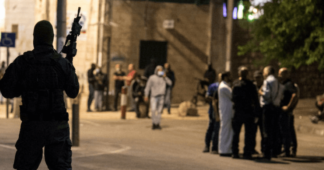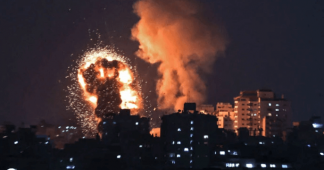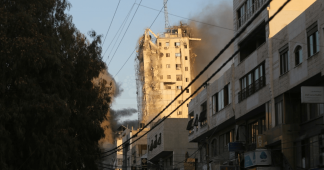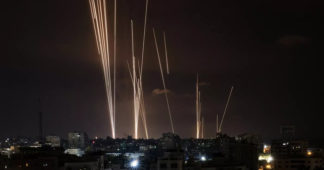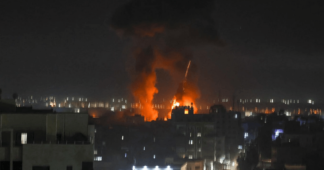Veteran Israeli analyst Meron Rapoport tells MEE that the Israeli military and intelligence is at a new low, and it may prove terminal for Netanyahu and his settler government
By Lubna Masarwa in Jerusalem
Oct 7, 2023
Israel is entering a situation in which it cannot control its own fate, veteran Israeli political analyst Meron Rapoport has told Middle East Eye.
The scale of the battles waged by Hamas and other Palestinian factions in Israeli territory has not been witnessed since 1948, when the state of Israel emerged from the Arab-Israeli war and ethnic cleansing of Palestinians.
Not even the 1973 Middle East war – when Egypt launched an attack on Israel almost 50 years ago to the day as it celebrated Yom Kippur – achieved this level of surprise, Rapoport said.
Rapoport described Israel’s intelligence services as placed in a state of shock, and that Israeli faith in the army has been rocked to its core. At least 250 Israelis were killed on Saturday, according to authorities.
“In 1973, we fought with a trained army,” Rapoport said. “And here, we are talking about people who have nothing but a Kalashnikov. It is unimaginable. It is a military and intelligence failure that Israel will take a long time to recover from, in terms of its self-confidence.”
For years, Israel has developed a sophisticated – and expensive – network of surveillance infrastructure in and around the Gaza Strip, which it has besieged since 2007.
“There are supposed to be cameras there, drones in the air,” Rapoport said. “Crossing that fence like that is unimaginable. This is an unimaginable blow to Israeli training itself.”
Rapoport noted that the Israeli army’s intelligence unit, known as Unit 8200, is able to know the most intimate details of Palestinians’ lives, yet was unable to know that a few hundred, or even thousand, fighters were going to stage a complicated and wide-ranging assault.
“They didn’t have the least idea, not 8200, not the Shin Bet,” he said in a reference to Israel’s internal counter-intelligence security service.
The effect that images this Palestinian assault has produced – including fighters strolling through Israeli towns, and leading women, children, and the elderly into captivity in Gaza – will have a profound effect on Israel’s public, Rapoport said.
“These images on television of girls whispering into a phone to the media, asking where the army is, saying ‘we are here alone and they are shooting outside and the army still hasn’t shown up’, the whole day. This will be very hard to recover from.”
For Netanyahu, a few bad options
How Israel’s government will respond is not yet clear.
Yet according to Rapoport, Prime Minister Benjamin Netanyahu’s options for regaining control of the narrative that Israel can dominate all the land between the Mediterranean Sea and the River Jordan are now limited.
Rapoport predicted that the gut response of the Israeli army would be to pulverise Gaza, and that the casualties could easily rise into the thousands. Already, air strikes on Saturday have killed at least 250 Palestinians.
But militarily, Rapoport said, there was “no significance” to an air attack, which would not stop Hamas. Palestinian fighters may have captured as many as 150 Israelis, who would be endangered if Israel decided to heavily bombard the Palestinian movement.
Instead, to do something meaningful, the Israeli army would have to go in on the ground and occupy part, or all, of Gaza.
“If Israel’s armed forces go into Gaza, they will do so with a lot less self-confidence than before, and there is no certainty that they are capable of a military conquest of Gaza,” Rapoport said.
“What makes it more complicated is if Israel sends its army in and tries to occupy Gaza, it would mean tens of thousands of Gazans killed and a refugee crisis with people fleeing their homes,” he added.
“There would also be hundreds of Israelis killed. Israeli society would be torn apart and have a very hard time processing a huge number of Israeli deaths.”
The prospect of tens of thousands of Palestinians dead in Gaza, not to mention a refugee crisis, runs the risk of triggering a regional war on a grand scale, one that might encompass Hezbollah in Lebanon; Palestinian factions and civilians in the occupied West Bank and Jerusalem; and even Syria and Jordan.
One option for Israel would be to follow the advice of its far-right finance minister, Bezalel Smotrich, who said in May that his country must reconquer Gaza.
“The time will probably come to return to Gaza, disassemble Hamas and demilitarize Gaza,” Smotrich told Channel 14 at the time. “This, too, will be carried out according to the broad interests and considerations of the State of Israel.
“I believe the moment will come when there won’t be a choice but to reconquer Gaza.”
The other option, Rapaport said, was to enter negotiations, as happened in 1973. “After the war in 1973, Israelis said: ‘Why did we have to have all those casualties? Why did we have to have that war and why did we have to have 3,000 deaths?’”
A terminal blow
Either way, Netanyahu has suffered a huge and – Rapoport thinks – terminal blow to his authority.
“I think that this is going to weaken the government because it owns this failure. All Netanyahu’s theories about building a wall and putting the Palestinians behind the wall and throwing away the key and making peace with Dubai: that whole concept is crashing down now. He has operational responsibility for what happened,” Rapoport said.
Netanyahu’s government is dominated by extremist, religious nationalists who are obsessional about Jewish settlement in the West Bank. Yet this focus on illegal settlements may end up being its undoing.
“People are saying that there were 33 battalions in the West Bank and that the army is stationed there to protect the settlers” instead of guarding the border, Rapaport said.
“Voices will be heard asking: ‘Why are we protecting the settlements and endangering ourselves?’.”
Rapoport added: “Israel is entering a situation in which it is not in control of its own fate. The loss of self-confidence is enormous, and the dimensions of the military failure likewise. The army has lost faith in itself and the public has lost faith in the army, and that will greatly influence any decision about going into Gaza.”
This article is available in French on Middle East Eye French edition.
We remind our readers that publication of articles on our site does not mean that we agree with what is written. Our policy is to publish anything which we consider of interest, so as to assist our readers in forming their opinions. Sometimes we even publish articles with which we totally disagree, since we believe it is important for our readers to be informed on as wide a spectrum of views as possible.
